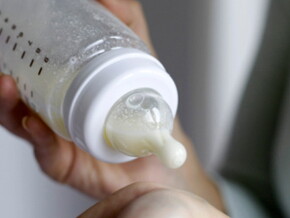
Planning for a new addition to your family is an exciting journey and comes with a long checklist of things to keep in mind. One of the most important is creating a healthy and safe environment for your child. Throughout their life, they’ll be exposed to many things out of your control – from bacteria, to allergens, viruses and infections. That’s why it’s crucial to build a strong immune system in the first few years, which starts during pregnancy, and continues once baby is brought into the world.
Prenatal Baby Nutrition
What a mother eats and drinks during pregnancy becomes her baby's main source of nourishment. According to Canada’s Food Guide, all women who are pregnant need a daily multivitamin containing 400 micrograms (0.4 mg) of folic acid. A supplement can help decrease the risk of neural tube defects and meet the extra folic acid needs for those pregnant and breastfeeding.[1]
In addition to folic acid, iron is another significant part of a mother’s diet. Iron plays an important role in lowering a mother’s risk of anemia and ensuring proper development of baby’s brain.[2] Iron can be found in red meat and foods such as rolled oats, tofu, chickpeas and spinach.
Omega-3 fatty acids are also an important part of your baby’s development. Health Canada advises that women who eat fish while pregnant give their growing fetus these important nutrients,[3] which help feed the brain and keep it healthy.[4] Omega-3 fatty acids are transferred across the placenta and play an integral role in the growth and development of the infant. It is recommended that women continue eating at least 150 grams (5 ounces) of cooked fish each week during pregnancy, paying attention to the type of fish that they eat.[5]
Postnatal Baby Nutrition
Your baby’s immune system starts to develop after birth. This takes place when an infant comes into contact with many different types of bacteria, including those from your birth canal, your skin, and your breast milk.[6],[7],[8]
When thinking about nutrition for your baby, breast milk is the best way to provide the right balance of nutrients needed to help them grow strong and healthy, which includes protein, vitamins, zinc, antibodies[9] and bacterial cultures.[10],[11],[12] These all help to contribute to the development of a healthy digestive tract and immune system. A strong immune system is critical because it helps your baby defend against harmful foreign invaders, like pathogenic (“bad”) bacteria and viruses, to keep them protected and healthy.
This article has been sponsored by Nestlé Baby & me, but all comments and opinions are my own.
All trademarks are owned by Société des Produits Nestlé S.A., Vevey, Switzerland and used under licence. ©2018 Nestlé.

Dr. Ted Jablonski, MD, CCFP, FCFP
Dr. Ted Jablonski is a Calgary-based family physician. He completed his medical education at the University of Manitoba and has practiced and taught medicine in rural Manitoba, Northern Saskatchewan, and Northwestern Ontario. In addition to his duties as a family physician and educator, Dr. Jablonski is a clinic associate at the Men’s Sexual Health Clinic at the Southern Alberta Institute of Urology and does consultant work in sexual and transgender medicine for Southern Alberta.
References:
[1] Government of Canada. Pregnancy and Breastfeeding. Retrieved from: https://www.canada.ca/en/public-health/services/pregnancy.html. Accessed on April 19, 2018.
[2] Iron needs of babies and children. Paediatrics & Child Health. 2007;12(4):333-334. Retrieved from: https://www.ncbi.nlm.nih.gov/pmc/articles/PMC2528681/. Accessed on April 19, 2018.
[3] Government of Canada. Prenatal Nutrition Guidelines for Health Professionals - Fish and Omega-3 Fatty Acids. Retrieved from: https://www.canada.ca/en/health-canada/services/food-nutrition/reports-publications/nutrition-healthy-eating/prenatal-nutrition-guidelines-health-professionals-fish-omega-3-fatty-acids-2009.html. Accessed on April 19, 2018.
[4] Academy of Nutrition and Dietetics. Do Kids Need Omega 3 Fats? Retrieved from: https://www.eatright.org/food/vitamins-and-supplements/types-of-vitamins-and-nutrients/do-kids-need-omega-3-fats. Accessed on April 19, 2018.
[5] Government of Canada. Prenatal Nutrition Guidelines for Health Professionals - Fish and Omega-3 Fatty Acids. Retrieved from: https://www.canada.ca/en/health-canada/services/publications/food-nutrition/prenatal-nutrition-guidelines-health-professionals-fish-omega-3-fatty-acids-2009.html. Accessed on April 19, 2018.
[6] Gueimonde M, et al. Neonatology 2007;92:64–66.
[7] Cabrera-Rubio R, et al. AJCN 2012;96:544–551.
[8] Khodayar-Pardo P, et al. Journal of Perinatology 2014;27 Mar: 1–7.
[9] Niers L, et al. Nutr Rev 2007;65:347–60. 8
[10] Gueimonde M, et al. Neonatology 2007;92:64–66.
[11] Khodayar-Pardo P, et al. Journal of Perinatology 2014;27 Mar: 1–7.
[12] Cabrera-Rubio R, et al. AJCN 2012;96:544–551.





















